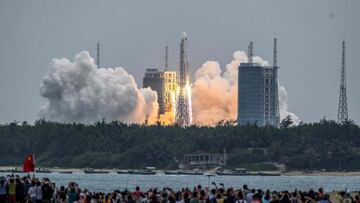Chinese rocket Long March 5B: why was it out of control and falling?
Chinese state media says remnants of the core stage of the Long March 5B rocket crashed into the Indian Ocean on Sunday.

The remains of a Chinese rocket that had been falling to Earth in an uncontrolled descent have landed in the Indian Ocean, Chinese state media has said.
Citing China’s Manned Space Agency, it reported that the core stage of the Long March 5B rocket re-entered Earth’s atmosphere at 10:24 am Beijing time on Sunday (10:24 pm EDT on Saturday).
Most of the rocket burned up on re-entry into the Earth’s atmosphere, state media added. No injuries have been reported.
US Space Command confirms re-entry over Arabian Peninsula
The US Space Command confirmed that the rocket re-entered the Earth’s atmosphere over the Arabian Peninsula at "approximately 10:15 pm EDT" on Saturday, but said it "is unknown if the debris impacted land or water".
In a statement published on its website, the Space Command added: “The exact location of the impact and the span of debris, both of which are unknown at this time, will not be released by U.S. Space Command.”
Carrying a 22-tonne payload with parts of a Chinese space station, the Long March 5B lifted off on 29 April from China’s Hainan island.
Space agencies can now direct spent rockets away from Earth, use remote controls
Rocket technology now allows space agencies to design the core stage of a rocket so that it is set adrift away from Earth’s atmosphere or ends up orbiting the Moon after use. Per France 24, spent rockets programmed to fall back to Earth can also be controlled remotely to ensure they crash into the ocean.
A drive to avoid space debris dropping onto potentially populated areas of land came after pieces of NASA’s Skylab fell from orbit and crashed into Australia in 1979.
Speaking to Reuters, Havard astrophysicist Jonathan McDowell said that most countries now take such safety measures. However, this is not what China did with the Long March 5B. Instead, its spent core stage was placed in an uncontrolled orbit around the Earth.
It started losing altitude last week as it interacted with the top of the Earth's atmosphere, which caused it to lose speed and altitude.
"It makes the Chinese rocket designers look lazy that they didn't address [the potential that the Long March 5B could crash on inhabited areas of land]," McDowell told Reuters.
In May 2020, debris from another Chinese Long March rocket crashed in the Ivory Coast, causing damage to buildings but no reported injuries.
"These two incidents [the May 2020 and May 2021 Long March re-entries] are the two largest objects deliberately left to re-enter uncontrolled since Skylab in 1979," McDowell told the BBC, adding that China’s space agency was guilty of "negligence".
NASA administrator: China "failing to meet responsible standards"
NASA administrator Bill Nelson said in a statement: "Spacefaring nations must minimize the risks to people and property on Earth of re-entries of space objects and maximize transparency regarding those operations.
"It is clear that China is failing to meet responsible standards regarding their space debris."
China dismisses "Western hype" over Long March 5B
China has rejected what it termed "Western hype" over the rocket's descent to Earth, insisting in the run-up to its re-entry into the atmosphere that it presented very little danger, despite uncertainty over where it would land.
Related stories
"It is common practice across the world for upper stages of rockets to burn up while re-entering the atmosphere," Wang Wenbin, a spokesman for China's foreign ministry, told a news conference on Friday.
"To my knowledge, the upper stage of this rocket has been deactivated, which means most of its parts will burn up upon re-entry, making the likelihood of damage to aviation or ground facilities and activities extremely low."

